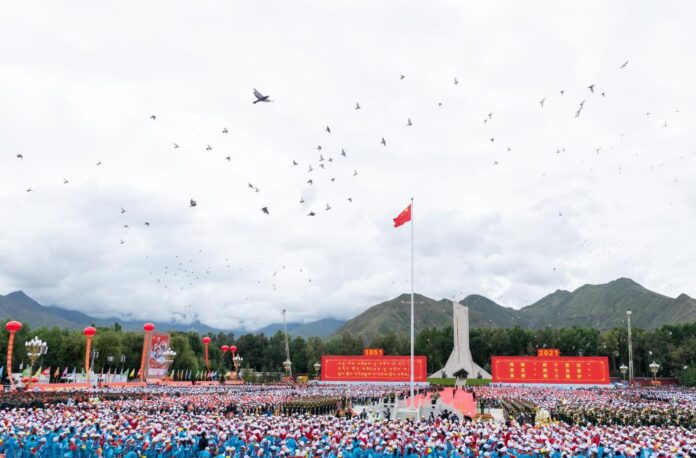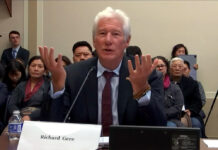(TibetanReview.net, Aug20’21) – To underline their strategic importance, China has put the 21 border counties in occupied Tibet Autonomous Region (TAR) under direct supervision and aid of its central government departments, reported the hindustantimes.com Aug 20, citing Wu Yingjie, the region’s communist party chief.
Addressing a gathering in Tibet’s capital Lhasa to mark the 70th anniversary of what China calls the region’s “peaceful liberation” on Aug 19, Wang was also quoted by state media as saying, “The population living at the border regions in Tibet has increased 10.5%.”
It was not clear how much this amounted to while according to China’s latest census data reported earlier this year, the TAR’s permanent resident population is around 3.64 million, an increase of 645,900 or 21.52% in the last decade.
Populating the otherwise geographically hostile border regions with the building of new villages and townships and recruiting their residents for border security tasks, including as members of newly set up people’s militia, have been a new focus of China under President Xi Jinping in recent years. These border residents are also made to hunt for caterpillar fungus and graze their herds in territories of neighbouring countries in China’s creeping expansionist design.
The main speaker at the event was Wang Yang, a member of the CPC’s seven-member Politburo Standing Committee and head of Chinese People’s Political Consultative Conference, who led a Central government delegation for the anniversary celebrations. He was reported to have stressed harmony and stability in TAR and national security and stability in the border areas. Officials and the general public of all ethnic groups should be mobilised to “forge an ironclad defence against separatist activities,” he was reported to have said.
He was reported to have underlined the next major task of the Chinese government in the TAR: All-round efforts to ensure that Tibetans use standard spoken and written Chinese and share the cultural symbols and images of the Chinese nation.
Wang, who oversees policy towards ethnic minorities, has also called for efforts to ensure that religions in China are Chinese in orientation and guide Tibetan Buddhism in adapting itself to socialist society. “No one outside China has the right to point fingers at us when it comes to Tibetan affairs,” Wang was widely quoted as saying.
He has expressed confidence that “any attempt or manoeuvre designed to separate Tibet from China is doomed to fail.”






